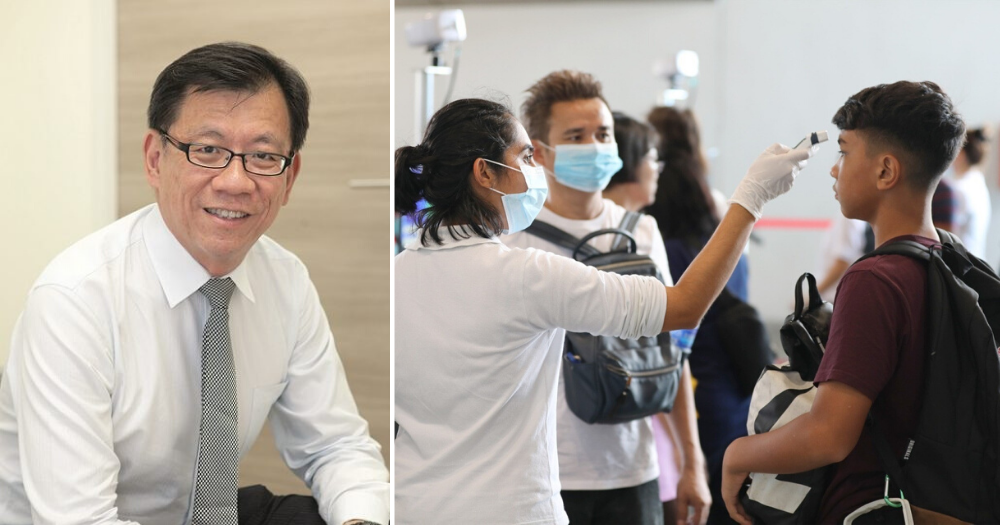As worries mount about the Wuhan virus crisis in Singapore, one doctor here has stepped forward to assuage fears and offer some advice.
Speaking to radio station 91.3's Flying Dutchman and Glenn Ong on Jan. 28, the doctor, Leong Hoe Nam, shared at length about the severity of the Wuhan virus, as well as ways Singaporeans can protect themselves from it.
Wuhan virus is "very virulent" but lower mortality than SARS
Leong is an Infectious Disease Specialist at Mount Elizabeth Novena Hospital.
During the session, Leong talked about the severity of the current Wuhan situation.
As of Feb. 2, 2020, there have been 304 deaths and over 14,000 confirmed cases in China.
Currently, there are 18 confirmed cases of the virus in Singapore.
According to Leong, the novel coronavirus is "highly pathogenic, very virulent and spreads very, very fast".
In this aspect, the novel coronavirus is worse than Severe Acute Respiratory Syndrome (SARS).
However, SARS has a higher mortality.
The 2003 pandemic killed 33 people in Singapore in the span of around three months.
Survived SARS
Incidentally, Leong might just be the perfect person to share advice on the novel coronavirus.
Leong was previously one of the infected persons during the SARS pandemic, and has survived to tell the tale.
The then 32-year-old had been attending a conference in New York, when he developed a fever.
He was subsequently taken off his flight back to Singapore, and isolated for two-and-a-half weeks at a ward in Frankfurt, Germany.
Just several days earlier, Leong had contracted the virus after treating the first SARS patient at Tan Tock Seng Hospital.
This took place in early March, when SARS had begun to spread in Singapore and the disease was not well understood.
Leong told The New Paper in 2015 that he "didn't know if [he] was going to live to the next day" and that his "life just flashed before [him]".
"Your face is sacred"
However, Leong believes that Singapore is much better prepared now than it was for SARS.
SARS, he told Today in 2017, was a "baptism by fire", and Singapore has since emerged from the crisis more knowledgeable and resilient.
He waved off the notion that suggested Singapore was the least prepared for an outbreak, and confidently dismissed them as "pure bull-*beep*".
"Singapore is really, really prepared. After SARS, so many protocols were written up, we've considered all scenarios," he said.
However, he confessed that these are "difficult times", and that the possibility of local transmission of the virus here -- something which has yet to occur as all confirmed cases involve Chinese nationals from Wuhan or others who had a travel history to Wuhan -- is "almost guaranteed".
He thus stressed that individual hygiene practices are still key to protect oneself against contracting the novel coronavirus.
One tip which Leong emphasised throughout the radio session and which he hoped would "go viral" was: "Your face is sacred".
The novel coronavirus is transmitted through droplets or contact of a surface, he explained, and can survive on a surface for between 30 to 60 minutes.
It is crucial that one should not touch one's face, nose, eyes or mouth before washing hands.
Other handy tips he shared included:
- Hand sanitisers work, but those containing alcohol are more effective. The higher the alcohol percentage the better.
- "Good old water" without soap works, as the water enters the virus via osmosis and kills it. However, soap and water is still preferable.
- Masks work to protect both the user and the people in front of the user.
- N95 masks work but are discouraged as they are uncomfortable to wear.
- If one has to go to a clinic, wear a mask and wash your hands after touching any surface.
- Throw away used masks which are wet.
- If a mask has been used before but is still relatively clean and dry, store it in a sealable bag to avoid spreading whatever germs there are on it. Discard it preferably by the end of the day.
- Avoid big groups and events, e.g. exercise classes, when and if local transmission of the virus occurs.
Kiasuism could strain our resources
In light of the panicked frenzy, as reports and fake news have incited some Singaporeans to react disproportionately, Leong also highlighted the need to "kill kiasuism".
This kiasu mentality, he said, could lead to paranoid people believing they had contracted the virus, overloading hospitals and clinics, and in turn depriving truly infected individuals with the necessary resources.
Singapore has first-world medical facilities, but Leong emphasised that these should not be overwhelmed, as it would simply end up "hurting our own people".
Perhaps, Leong was alluding to the speed with which face masks have been snapped up, so much so that numerous businesses have had to impose quotas on the number of masks one could purchase.
If you would like to hear more from Leong, you can watch the full half hour radio session on Facebook here.
Top photo from rophiclinic.com.sg and K Shanmugam Sc / FB
Content that keeps Mothership.sg going
??
Quick!!! Cheap food, flights and activities here!
??
Technology can be scary for older folks, but it doesn’t have to be.
If you like what you read, follow us on Facebook, Instagram, Twitter and Telegram to get the latest updates.
